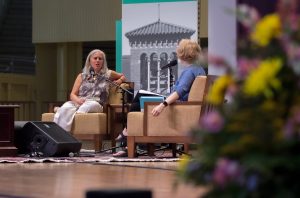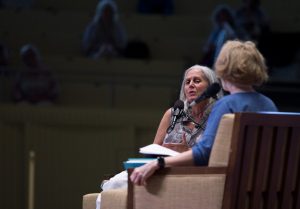
She named her daughter Charis, the root of which means grace; her three books center on grace; and her theological journey has considered grace at all stages.
With all of that in mind, Krista Tippett said Serene Jones has “rock-solid grace credentials.”
Tippett, journalist, author and host of “On Being with Krista Tippett,” interviewed Jones, president of the Union Theological Seminary in New York City, the first female president in the seminary’s 180-year history, at 10:45 a.m. Thursday in the Amphitheater, continuing Week Seven’s morning lecture series, “Grace: A Celebration of Extraordinary Gifts — A Week in Partnership with Krista Tippett and ‘On Being.’ ”
The aptly named hymn resounds, “I once was lost, but now I’m found,” and from that, Jones found her life transformed.
“I once was a happy, but confused Christian child, and now I am a wiser, still fundamentally happy, but humble Christian leader; humbled by my life, but also by the complexities, horrors and gifts of the Christian faith,” Jones said.
The Christian faith was a fundamental part of Jones’ life. She grew up attending a Disciples of Christ Christian church, where her father was a minister.
“Our church was the center of our life,” Jones said. “I had the wonderful advantage of growing up in a progressive Disciples community, so it was where I learned, from the time I could walk, about social justice, racism and what it meant to be a church.”
In the teachings of her church, Jones learned the meaning of grace and the purpose it serves.
“From the time I heard the word ‘God,’ I thought, ‘God means love and love is universal, and we are all loved,’ ” she said. “That’s grace.”
So where does theology fit in? To Jones, it serves as “a place and a story.”
“God means love, love is universal, we are all loved, and that’s grace,” says @SereneJones
— The Chautauquan Daily (@chqdaily) August 8, 2019
“Theology is the place and the story you think of when you ask yourself about the meaning of your life, of the world, of the possibility of God,” Jones said.
For Jones, that place sits “windswept, but defiant” on a plain in Oklahoma; specifically, in the middle of a farm in the outskirts of Billings.
“I go there again and again, to this dusty piece of land, to remember what is true and to find God,” Jones said. “I go there to find my story, my theology. I go there to be born again, to be made whole, to unite with what I was, what I am and what I will become.”
The state of Oklahoma, where both Tippett and Jones grew up, has a “complicated moral and ethical thinking in its DNA,” according to Tippett. Jones said the story of her dichotomous family settling in Oklahoma is a microcosm of all the conflicts and contradictions of modern-day America.
The family of Jones’ grandmother arrived in Oklahoma on a wagon train from Pennsylvania; her family was largely a Godly and upstanding one. Jones’ grandfather, who her Pennsylvania-born grandmother would eventually marry, came on a train from Tennessee with his family, running from the law after a family member killed a man and stole a horse.
“It was the meeting of these two different worlds: One, this staunchly, Disciple homesteading couple and one, these renegade outlaws,” she said.
Growing up, Jones spent a lot of time in Okemah, Oklahoma, a city she said embodies the birth of the state and added to the complexity of the 1921 Tulsa race riots; it all comes together in a “troubling story.”
Jones was listening to a lecture at Yale University, and behind the lecturer hung postcards of lynching victims. At one point, a postcard fell. It had a photo of a young woman and her son lynched from a bridge. At the bottom it read, “Laura Nelson, 1911, Okemah, Oklahoma.”

When Jones saw the location, her world “imploded.” In 1911, the town’s population was around 300, two-thirds of which were her family members.
“There was no way that my family did not know, or most likely participated in (the lynching),” Jones said.
“But it’s not a story that can be passed down,” Tippett said.
“If they had not participated, they would have told the story,” Jones said.
The complicated “story of us,” found in Oklahoma’s history, was also apparent in another part of Jones’ life. Jones attended a Christian summer camp, and as her group sang “This Land is Your Land,” she found out — for the first time — that there were more verses to the song.
“It was like singing a beloved hymn and suddenly discovering that you have only been singing a fraction of the song, and the hard parts were locked off,” she said.
They began singing the standard verse, “This land is your land, this land is my land, from California, to the New York island; from the redwood forest to the Gulf Stream waters, This land was made for you and Me.”
Then came the verse Jones had never heard.
“There was a big high wall there that tried to stop me. The sign was painted, said ‘Private Property.’ But on the backside, it didn’t say nothing. This land was made for you and me. One bright sunny morning, in the shadow of the steeple, by the relief office, I saw my people. As they stood hungry, I stood there wondering, if God blessed America for me.”
Jones says she thinks that in America, all of our harms of our past have come up to claim us all at once.
— The Chautauquan Daily (@chqdaily) August 8, 2019
Because the “hard parts were locked off” for her, Jones could not develop a full understanding of the song. Similarly, Jones said, good theology must be “public theology.”
“What is theology if it’s not talking about our collective lives, the meaning and purpose of our lives and how we are supposed to live together and who God is, in ways that are part of our conversation together?” Jones said.
Tippett and Jones were at Yale Divinity School at the same time, but never met. But Tippett remembers walking by one of Jones’ systematic theology lectures, the first time she heard Jones mention the importance of John Calvin in theology.
Jones said people are surprised she “actually likes Calvin,” but he wasn’t always a figure she admired. However, after a year of living in India and the Philippines in the midst of civil war, she saw Calvin in a new light.
“I suddenly found in John Calvin a writer who was trying to engage a community of people who felt sieged and oppressed,” she said. “Quite literally, there was a war taking place against French Protestants; they were fleeing to Geneva, and John Calvin was trying to give them sustenance. He was trying to tell them a story about God that would get them out of bed in the morning, which changed everything about how he sounded to me.”
One of Calvin’s fundamental beliefs was in the sovereignty of God, which means there is nothing humans can do that won’t “unfold before Him.”
“(Calvin believed that) God sees us and loves us, and that’s why we’re here,” Jones said. “The complicated character of human life is that, on one hand, God creates us to be glorious; he gives us powers of intellect and love and connection and art, and we are capable of amazing, extraordinary accomplishments. Yet, right next to this glorious side, is this weird propensity that human beings have — to choose what is not good for them, to choose evil, to sin.”
Jones said Calvin won’t let go of the “broken part of who we are,” and according to her, no one should forget those broken parts — especially moments of trauma.
“One of the things I have learned is that not just individuals, but whole communities undergo trauma,” Jones said. “One of the characteristics of trauma is the deep human desire to repress it and to not deal with the harms that have happened.”
But the truth in both individual and collective trauma, is that the horror haunts people until they face the truth of what happened, Jones said.
“I think what is happening in our nation today is that all of the horrors of the past have come up to claim us — all of us — and they’re not going to let us go until we take the stride of reckoning with them,” she said. “But we’re terrified of doing that.”
Her perceptions of collective trauma have led her on a journey of understanding the construction of whiteness in America. Jones’ great-grandmother was Cherokee, and when Jim Crow laws were implemented in Oklahoma, her great-grandmother declared herself as “pure white.”
“You’re set free… by the telling of the truth,” @SereneJones
— The Chautauquan Daily (@chqdaily) August 8, 2019
“In stories of white supremacy, liberal white people today want to put that in the past and not reckon with how close it is to who we are now,” Jones said. “For me, I wasn’t allowed that dangerous innocence once I saw it so close to home.”
At the heart of the nation’s turmoil, Jones said, is a misguided perception of equality.
“People, honestly, do not believe that we are all equal and loved equally and equally valued,” she said. “That crosses the aisle and it’s a theological issue.”
In both trauma and grief, Tippett said the concept of resolution is not theological because it’s not “reality based.” According to Jones, a more important moment than resolution happens when “grief becomes mourning.”
“To move from grief to mourning is to move from a place of sheer loss to a place of acknowledging the loss and mourning the permanence of the loss,” Jones said. “It can’t be fixed, but also, it creates a space in mourning for you to make sacred the pain, so the rest of your life is transformed by it. It allows the possibility of a future.”
Another theological notion of grace is repentance, a very “active and visual” concept.
“Repentance is a powerful word, and it means to walk in a different direction; it means to do it differently,” Jones said. “It’s much more than ‘I’m sorry.’ It’s saying, ‘That is horrible and this is the path we are going to walk on together to fix it’ — not fix it in the sense of cover up the past, but fix it so that the horrors that hold us don’t keep happening.”
Grace is more original than sin, Jones said, because “grace wins.”
“Our sinfulness is not who we are, and that means that in this theology, which is suffused to Christianity, is that the love of God, the love of the universe, is stronger and more powerful and persistent, larger, greater, more eternal than anything,” she said. “That’s grace, and that’s the grace that changes how we experience everything.”
One of Christianity’s greatest sins is that it refuses to engage other religions seriously — and with grace. According to Jones, all voices have to be included to get out of the “period of reformation” the world is in now.
“For me, I just turned 60 two weeks ago, and I realize it’s my work to do, but I’m not going to be here to see what comes,” Jones said. “That’s OK, but we have a lot of work to do in these next years of all of us together, even if we don’t know where we’re going.”
“Grace is more original because grace wins,” @SereneJones
— The Chautauquan Daily (@chqdaily) August 8, 2019




